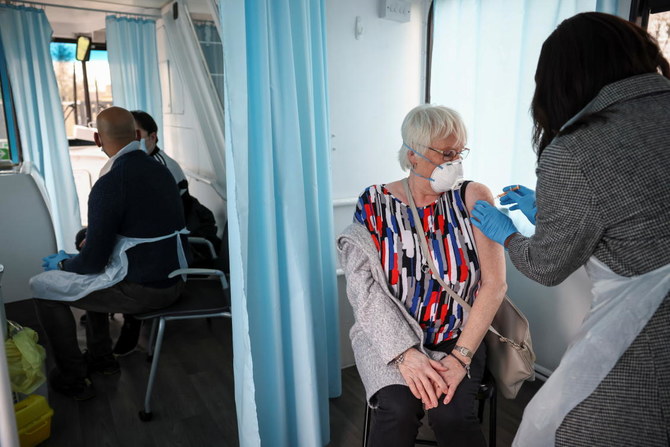LONDON: The UK government said Sunday that it reached its goal of giving at least one COVID-19 vaccine shot to the most vulnerable people in the country, increasing pressure on ministers to clarify when they will ease a lockdown imposed in early January.
Some 15 million people, or 22% of the UK population, have received their first shot or were offered one. The figure includes most people in the government’s top four priority groups, including everyone over 75, frontline healthcare workers and nursing home staff.
“15,000,000! Amazing team,'' Nadhim Zahawi, the vaccines minister, said in a tweet that featured a red heart. “We will not rest till we offer the vaccine to the whole of phase1 the 1-9 categories of the most vulnerable & all over 50s by end April and then all adults.''
British Prime Minister Boris Johnson plans to unveil his roadmap for easing restrictions on Feb. 22 amid signs that infection rates, hospitalizations and deaths have fallen sharply since England’s third national lockdown began on Jan. 4.
Jockeying has already begun between those who want the measures lifted as soon as possible and those who fear moving too fast will lead to a resurgence of the virus.
Britain got a head start on its vaccination effort in December, when it became the first country to authorize widespread use of a COVID-19 shot. It ranks behind only Israel, 71%, the Seychelles, 53%, and the United Arab Emirates, 50% in the percentage of people who have received one dose, according to data compiled by Oxford University. The US is fifth at 15%.
At the same time, rules that have closed schools, restaurants and nonessential shops in the UK are starting to pay off. The number of new infections, hospital admissions and deaths recorded over the past seven days have all dropped by more than 20% from the previous week, according to government figures.
When Johnson announced the lockdown, he said the government would review the measures in mid-February based on their success in controlling the pandemic and progress in the vaccination effort. Johnson’s first priority is to reopen schools, and he has promised to give schools two weeks notice to give teachers time to prepare for the return of students.
The prime minister on Saturday applauded the vaccine rollout but urged people to be cautious.
“We have still got infections running very high throughout the country — levels which last year we would have thought were really very high indeed — (and) still, sadly, a great many deaths in our hospitals,” he said during a visit to a vaccine manufacturing facility in northeastern England. “Although the number is beginning to come down, and perhaps starting to come down quite fast, we need to look at the data very, very hard.”
Britain has reported over 117,000 virus-related deaths, the highest toll in Europe.
Mark Harper, a member of Parliament from the ruling Conservative Party, last week warned the government against “moving the goalposts” for deciding when to ease the lockdown.
Johnson should start by reopening schools, then gradually lift other restrictions as more people are vaccinated, said Harper, who leads a group of about 70 lawmakers who have lobbied for the government to consider the negative economic and social impacts of the restrictions, along with the health benefits.
“If you think about the restrictions that the government’s placed on everybody, they are the toughest set of restrictions that have ever been placed on the British people outside of the Second and First World Wars,” Harper told the BBC. “So it’s kind of just worth stepping back a bit and saying, ‘This isn’t normal, and it shouldn’t continue, frankly, for a moment longer than it’s absolutely necessary.’”
After meeting the target for reaching the most vulnerable people, UK authorities will progressively expand the vaccination drive to the next five priority groups until everyone over 50 and vulnerable younger people with health conditions that put them at higher risk from the virus have been offered the vaccine.
Public health officials say the top nine priority groups account for 99% of the deaths caused by COVID-19 so far.
While the vaccines currently authorized for use in the UK require two doses to ensure full protection against COVID-19, British authorities say one dose provides a significant level of protection.
Because of this, they have made it their priority to give the first dose to as many people as possible as quickly as possible. To do this, Britain has suggested that the second dose be administered after three months, instead of one month as recommended by the manufacturers.
Jeremy Farrar, director of the Wellcome Trust health think tank, said the number of COVID-19 infections in Britain is still too high to think about lifting the restrictions.
“We’ve made enormous progress … but the transmission is incredibly high still and we’ve got to get it lower,” he said.
There are other dangers on the horizon. UK government scientific advisers say the COVID-19 variant now predominant in the country may be up to 70% more deadly than previous variants, underscoring concerns about how mutations may change the characteristics of the disease.
The findings from the New and Emerging Respiratory Virus Threats Advisory Group, published Friday on the government’s website, confirm preliminary research released Jan. 21. The group, known as NERVTAG, includes experts from universities and public agencies across the UK
The new report is based on analysis of a dozen studies that found the so-called Kent variant, named after the county where it was first identified, was 30% to 70% more deadly than other variants. The studies compared hospitalization and death rates among people infected with the variant and those infected with other variants.
“Based on these analyses, it is likely that infection with (the Kent variant) is associated with an increased risk of hospitalization and death compared to infection with non-variant of cancer viruses,” the advisory group said. “It should be noted that the absolute risk of death per infection remains low.”
UK hits target: Gives at least 1 vaccine shot to 15 million
https://arab.news/6y7sy
UK hits target: Gives at least 1 vaccine shot to 15 million

- The UK will start administering vaccines from Monday to those aged between 65 and 69 and the clinically vulnerable to COVID-19
- Britain has registered nearly 117,000 deaths within 28 days of a positive COVID-19 test
Text messaging scammers stole $2M in cryptocurrency from victims, says NY lawsuit

- Scammers used unsolicited text messages to target people looking for remote work
- Victims were told to review products online in order to help generate “market data”
NEW YORK: Scammers stole millions of dollars in cryptocurrency from people seeking remote work opportunities as part of an elaborate scheme, according to New York’s attorney general.
Attorney General Letitia James said Thursday that she’s filed a lawsuit in order to recover more than $2 million that she said was stolen from New Yorkers and others around the country.
James said the unknown network of scammers used unsolicited text messages to target people looking for remote work.
They told victims that the job involved reviewing products online in order to help generate “market data,” James’ office said. But in order to begin earning money, victims were told they had to open cryptocurrency accounts and had to maintain a balance equal to, or greater than, the price of the products they were reviewing.
The victims were assured they would get their investments back plus commission, but the funds simply went into the scammers’ crypto wallets, James’ office said. The product reviews were also conducted on a website set up as part of the scheme.
The suit cites seven victims, identified by pseudonyms, residing in New York, Virginia and Florida. One New York victim lost over $100,000, according to the suit. A Florida woman lost over $300,000.
“Deceiving New Yorkers looking to take on remote work and earn money to support their families is cruel and unacceptable,” she said in a statement. “Scammers sent text messages to New Yorkers promising them good-paying, flexible jobs only to trick them into purchasing cryptocurrency and then stealing it from them.”
James’ suit seeks to return the stolen funds.
Queens District Attorney Melinda Katz said her office’s cryptocurrency unit traced over $2 million in stolen crypto and identified the digital wallets where the coins were being held. Then, working with James’ office, they were able to have the currency frozen until they could be returned to victims.
“Work scams that prey on those seeking legitimate employment not only rob victims of their hard-earned money but also shatter their trust in the job market,” she added.
UK finance minister seeks ‘pragmatic’ relations with China to boost trade

- Rachel Reeves is seeking to revive high-level economic and financial talks that have been frozen since 2019
- China is Britain’s fourth-largest trading partner, accounting for goods and services trade worth almost $138 billion
BEIJING: British finance minister Rachel Reeves said on Saturday during a visit to Beijing that she intended to have “pragmatic” relations with Chinese leaders to boost exports to the world’s second-largest economy.
Under pressure from market turmoil at home, Reeves is seeking to revive high-level economic and financial talks that have been frozen since 2019.
She joins the UK-China Economic and Financial Dialogue meeting in Beijing with Chinese Vice Premier He Lifeng on Saturday, before traveling to Shanghai, accompanied by Bank of England Governor Andrew Bailey and other finance leaders.
She is due to discuss financial services, trading ties and the importance of cooperation on issues like climate change, the Treasury said.
Her appearance offers a chance to persuade investors that she has plans to deal with a sharp increase in British government borrowing costs, due in part to a global bond selloff which threatens to derail her budget plans.
“The fiscal rules that I set out in my budget in October are non-negotiable and growth is the number one mission of this government to make our country better off,” Reeves told reporters after visiting a Brompton bicycles shop in Beijing.
“That’s why I’m in China to unlock tangible benefits for British businesses exporting and trading around the world to ensure that we have greater access to the second-largest economy in the world.”
Reeves’ visit follows a dialogue opened last year between Prime Minister Keir Starmer and President Xi Jinping, the first between the two countries’ leaders since 2018.
The approach taken by the Labour government, elected in July, contrasts with the previous Conservative administration which took a robust approach to differences with China — particularly over human rights, Hong Kong and allegations of Chinese espionage.
Asked on Thursday if Reeves would raise human-rights issues, Starmer’s spokesperson said her visit would fit with London’s stance that it would take a strategic approach to China and challenge it “robustly” when necessary.
Starmer has long described his desire to build a relationship with China that is “rooted in the UK’s national interests” by boosting trade, a task that may become more difficult if US President-elect Donald Trump follows through on his threat to impose tariffs on all imports.
Asked whether Britain would follow Washington and Brussels in imposing tariffs on Chinese electric vehicles, Reeves said: “We keep issues under review but we make decisions in our national interest.”
British car manufacturers “like Jaguar and Land Rover export substantially to Chinese markets, and we want to help them to grow.”
China is Britain’s fourth-largest trading partner, accounting for goods and services trade worth almost 113 billion pounds ($138 billion).
2024 was the hottest year on record, scientists say

- C3S confirms first year above 1.5C since pre-industrial times
- Climate change impacts, severe weather visible globally
- Political will to curb emissions wanes despite rising climate disasters
BRUSSELS, Belgium: Global temperatures in 2024 exceeded 1.5 Celsius above the pre-industrial era for the first time, bringing the world closer to breaching the pledge governments made under the 2015 Paris climate agreement, scientists said on Friday.
The World Meteorological Organization confirmed the 1.5C breach, after reviewing data from US, UK, Japan and EU scientists.
“Global heating is a cold, hard fact,” United Nations Secretary-General António Guterres said in a statement. “There’s still time to avoid the worst of climate catastrophe. But leaders must act – now.”
The bleak assessment came as wildfires charged by fierce winds swept through Los Angeles, with 10 people dead and nearly 10,000 structures destroyed so far. Wildfires are among the many disasters that climate change is making more frequent and severe.
The European Union’s Copernicus Climate Change Service (C3S) said climate change was pushing the planet’s temperature to levels never before experienced by modern humans. Scientists have linked climate change to greenhouse gas emissions, mainly from burning fossil fuels.
The planet’s average temperature in 2024 was 1.6 degrees Celsius higher than in the 1850-1900 pre-industrial period, C3S said. The last 10 years are the 10 hottest years on record, the WMO said.
Climate change is worsening storms and torrential rainfall, because a hotter atmosphere can hold more water, leading to intense downpours. Atmospheric water vapor reached a record high in 2024, and the US National Oceanic and Atmospheric Administration said it was the third-wettest year on record.

In 2024, Bolivia and Venezuela suffered disastrous fires, while torrential floods hit Nepal, Sudan and Spain, and heat waves in Mexico and Saudi Arabia killed thousands. While climate change now affects people from the richest to the poorest on Earth, political will to address it has waned in some countries.
Governments promised under the 2015 Paris Agreement to try to prevent the average global temperature rise from exceeding 1.5C above pre-industrial levels.
US President-elect Donald Trump, who takes office on Jan. 20, has called climate change a hoax, dismissing the global scientific consensus. During his first term in office he withdrew Washington from the Paris Agreement, and he has vowed to push greater fossil fuel production and roll back President Joe Biden’s push toward alternative energy.
Recent European elections have shifted political priorities toward industrial competitiveness, with some European Union governments seeking to weaken climate policies they say hurt business.
Matthew Jones, a climate scientist at the University of East Anglia in Britain, said climate-linked disasters will grow more common “so long as progress on tackling the root causes of climate change remains sluggish.”
EU climate commissioner Wopke Hoekstra said the 1.5C breach last year showed climate action must be prioritized.
“It is extremely complicated, in a very difficult geopolitical setting, but we don’t have an alternative,” he told Reuters.

The 1.5C milestone should serve as “a rude awakening to key political actors to get their act together,” said Chukwumerije Okereke, a professor of climate governance at Britain’s University of Bristol.
Britain’s Met Office confirmed 2024’s likely breach of 1.5C above pre-industrial levels, while estimating a slightly lower average temperature of 1.53C for the year.
Buontempo noted that 2024 did not breach that target since it measures the longer-term average temperature, but added that rising greenhouse gas emissions put the world on track to blow past the Paris goal soon.
Countries could still rapidly cut emissions to avoid temperatures from rising further to disastrous levels, he added.
“It’s not a done deal. We have the power to change the trajectory,” Buontempo said.
Concentrations in the atmosphere of carbon dioxide, the main greenhouse gas, reached a fresh high of 422 parts per million in 2024, C3S said.
Zeke Hausfather, a research scientist at US non-profit Berkeley Earth, said he expected 2025 to be among the hottest years on record, but likely not top the rankings. He noted that temperatures in early 2024 got an extra boost from El Niño, a warming weather pattern now trending toward its cooler La Nina counterpart.
“It’s still going to be in the top three warmest years,” he said.
Greenland’s leader says his people don’t want to be Americans as Trump covets territory

- “We do not want to be Danish, we do not want to be American. We want to be Greenlandic,” Múte B. Egede tells press conference
- He added, though, that he understands Trump’s interest in the island given its strategic location and he’s open to a dialogue with the US
COPENHAGEN, Denmark: Greenland’s prime minister said Friday that the mineral-rich Arctic territory’s people don’t want to be Americans, but that he understands US President-elect Donald Trump’s interest in the island given its strategic location and he’s open to greater cooperation with Washington.
The comments from the Greenlandic leader, Múte B. Egede, came after Trump said earlier this week that he wouldn’t rule out using force or economic pressure in order to make Greenland — a semiautonomous territory of Denmark — a part of the United States. Trump said that it was a matter of national security for the US.
Egede acknowledged that Greenland is part of the North American continent, and “a place that the Americans see as part of their world.” He said he hasn’t spoken to Trump, but that he’s open to discussions about what “unites us.”
“Cooperation is about dialogue. Cooperation means that you will work toward solutions,” he said.
Egede has been calling for independence for Greenland, casting Denmark as a colonial power that hasn’t always treated the Indigenous Inuit population well.
“Greenland is for the Greenlandic people. We do not want to be Danish, we do not want to be American. We want to be Greenlandic,” he said at a news conference alongside Danish Prime Minister Mette Frederiksen in Copenhagen.

Trump’s desire for Greenland has sparked anxiety in Denmark as well as across Europe. The United States is a strong ally of 27-nation European Union and the leading member of the NATO alliance, and many Europeans were shocked by the suggestion that an incoming US leader could even consider using force against an ally.
But Frederiksen said that she sees a positive aspect in the discussion.
“The debate on Greenlandic independence and the latest announcements from the US show us the large interest in Greenland,” she said. “Events which set in motion a lot of thoughts and feelings with many in Greenland and Denmark.”
“The US is our closest ally, and we will do everything to continue a strong cooperation,” she said.
Frederiksen and Egede spoke to journalists after a biannual assembly of Denmark and two territories of its kingdom, Greenland and the Faroe Islands. The meeting had been previously scheduled and wasn’t called in response to Trump’s recent remarks. Trump’s eldest son also made a visit to Greenland on Tuesday, landing in a plane emblazoned with the word TRUMP and handing out Make America Great Again caps to locals.

The Danish public broadcaster, DR, reported Friday that Trump’s team encouraged homeless and socially disadvantaged people in Greenland to appear in a video wearing the MAGA hats after being offered a free meal in a nice restaurant. The report quoted a local resident, Tom Amtof, who recognized some of those in a video broadcast by Trump’s team.
“They are being bribed, and it is deeply distasteful,” he said.
Greenland has a population of 57,000. But it’s a vast territory possessing natural resources that include oil, gas, and rare earth elements, which are expected to become more accessible as ice melts because of climate change. It also has a key strategic location in the Arctic, where Russia, China and others are seeking to expand their footprint.
Greenland, the world’s largest island, lies closer to the North American mainland than to Denmark. While Copenhagen is responsible for its foreign affairs and defense, the US also shares responsibility for Greenland’s defense and operates an air force base there based on a 1951 treaty.
Guinea suspends ‘unauthorized’ political movements

- Government spokesman Ousmane Gaoual Diallo said earlier that the West African nation could hold elections by the end of 2025 after a constitutional referendum “probably in May”
CONAKRY: Guinea’s government has demanded the suspension of all political movements it deemed “without authorization,” as the country’s military leaders hinted at possible elections this year.
In a statement read by a presenter on state television, the minister for territorial administration and decentralization, Ibrahima Kalil Conde, “noted with regret the proliferation of political movements without prior administrative authorization.”
“Consequently, all these political movements are asked to cease their activities immediately and to submit an application for administrative authorization to our ministry for their legal existence,” the statement added.
The junta, which seized power in a 2021 coup, has, in recent days, hinted at the possibility of elections by the end of the year.
Under international pressure, the military leaders had initially pledged to hold a constitutional referendum and hand power to elected civilians by the end of 2024 — but neither has happened.
Junta chief Gen. Mamady Doumbouya said in a New Year’s speech that 2025 will be “a crucial electoral year to complete the return to constitutional order.”
Government spokesman Ousmane Gaoual Diallo said earlier that the West African nation could hold elections by the end of 2025 after a constitutional referendum “probably in May.”
Since taking power, the junta has cracked down on dissent, with many opposition leaders detained, brought before the courts, or forced into exile.
In October, the junta placed the three main political parties under observation and dissolved 53 others in what it termed a major political “cleanup.”
It suspended another 54 for three months.
In Thursday’s statement, Conde said that national and international institutions and partners should “cease all collaboration with the 54 suspended political parties until 31 January 2025.”






















